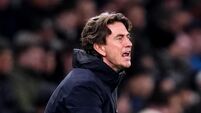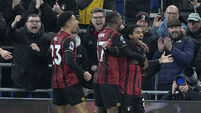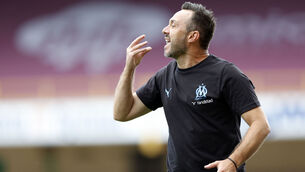Doping claims met with denial
Equally as expected it has also seen its leading authorities just shrug and look the other way.
The developments arose from the ongoing trial of Spanish doctor Eufemiano Fuentes who, along with four co-accused, is facing two years in jail for public health offences. The proceedings follow 2006’s ‘Operación Puerto’, which uncovered evidence of widespread drug use in professional cycling in Spain.
Evidence of doping in football quickly emerged during the proceedings, with the code ‘RSOC’ written on Fuentes’ documents disclosed in court. This suggested Primera Division club Real Sociedad had been a client, but the accused was surprisingly not asked to decipher his code.
The cover was off on Monday when Inaki Badiola, La Real president in 2008, did an explosive interview in sports daily AS, saying ‘RSOC’ looked a reference to his former club to him.
“In the six seasons before [I took charge], directors paid for medicines or products which in that moment were categorised as used in doping,” Badiola said. “These were acquired with dirty money on the black market.”
This was extra incendiary as president between 2001 and 2005 — including the 2001/02 season when they almost won the Spanish title — was Jose Luis Astiazaran. Astiazaran is currently president of Spain’s Liga de Futbol Profesional. Badiola, who had made similar allegations in 2008, said this showed how little Spanish football cared about investigating and punishing doping.
“In any normal country, with proof existing of involvement in banned practices, [Astiazaran] would be immediately removed from his position,” he said.
“In Spain what happens is things move slowly, or not at all.”
Astiazaran quickly released a statement denying any knowledge or suspicion of illegal practices by the club’s medical services during his time there, while Real Sociedad’s current board also issued a strong statement denying any involvement.
Meanwhile, the evidence was mounting. AS released a video which allegedly showed Badiola discussing an annual payment of €327,443 by La Real to Fuentes, off the books, during Astiazaran’s tenure.
El País published receipts, apparently in Fuentes’ writing, which contained the codes ‘RSOC’ and ‘Asti’ alongside the names of banned substances. One was Actovegyn, known as ‘Poor Man’s EPO’, the newspaper said.
This looked pretty serious, and worth discussing at the very least, but Real Federacion Espanola de Futbol [RFEF] president Angel Maria Villar dismissed the issue before Spain’s midweek friendly against Uruguay in Qatar.
“Thanks be to God, there is no doping,” Villar told El País. “Well, very little, so little that the cases given are just an anecdote to an anecdote. In Spain, players take many tests each weekend, and nobody is found to be positive. That is the reality. The rest is just talk, talk, talk...”
World Cup 2010 and Euro 2012-winning Spain coach Vicente Del Bosque also played dumb.
“I have never seen [doping], not as a player or a coach, nor do I believe that I will see it in the future,” Del Bosque said. “I prefer to be an innocent than to think it exists.”
Current Real Sociedad figures have reacted with more indignation than self-searching. Long-serving playmaker Xabi Prieto claimed that “no substance helps you put the ball in the top corner.”
“The image of La Real is not good at the moment,” the club’s French coach Philipe Montanier said. “Anything that touches our institution is not a good thing.”
Montanier is right about that, but surely just ignoring the allegations and hoping they go away is not the best way to clean his club’s image.
More football-related revelations are likely to emerge as the Puerto trial runs until March 22. These may force Astiazaran, Villar, Del Bosque and company to change their tune and address the doping issue. In any normal country they surely would.
On the pitch, with Lionel Messi only scoring once in Barcelona’s 6-1 win against Getafe yesterday, Cristiano Ronaldo may just be edging their personal battle to be the world’s current best player.
Ronaldo’s hat-trick in Saturday’s 4-1 victory against Sevilla at the Bernabeu means he has 11 goals in five La Liga games in 2013, despite a niggling thigh injury.
An under-par Messi has only managed a paltry eight in his five league appearances this year even though he seems fully-fit.
Ronaldo, who turned 28 last Tuesday, also seems happier in his own skin just now. He told AS this week that his ‘unhappiness’ from earlier in the season had passed.
“Yes, something has changed, because I am doing what I like, playing football”, he said. “ At this moment I feel better than I did then.”













